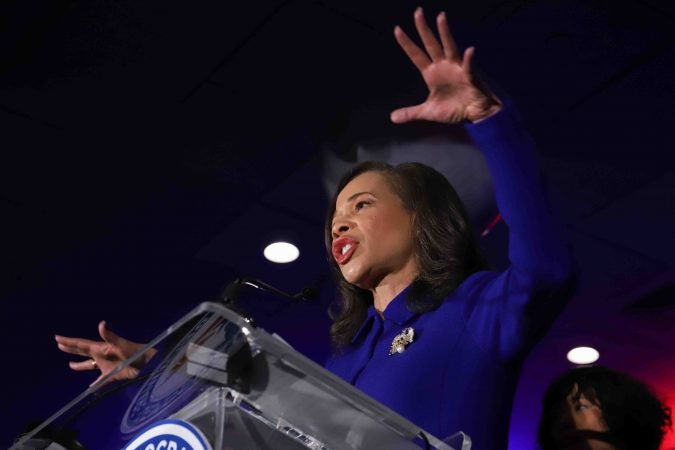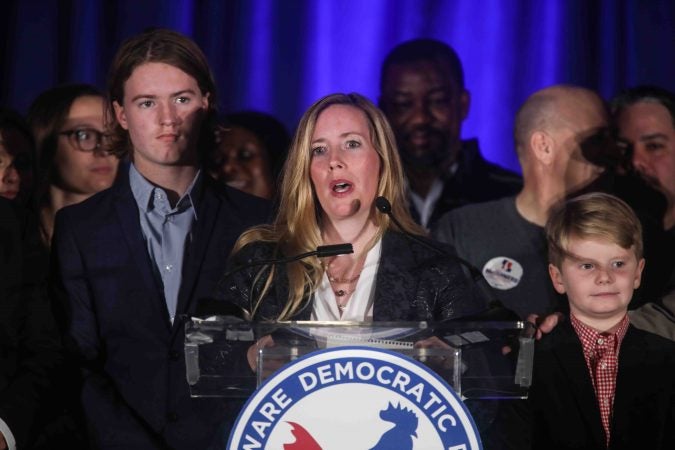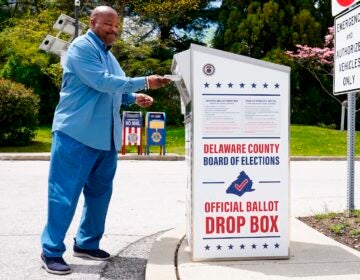Democrats sweep Delaware statewide offices
When President Trump declared last week that the “Blue Wave is dead,’’ he clearly wasn’t talking about Delaware.
-

State senator elect Laura Sturgeon address supporters during Democrat watch party Tuesday, Nov. 06, 2018, at the Doubletree Hotel in Wilmington, Delaware. (Saquan Stimpson for WHYY)
-

Incumbent Democrat Lisa Blunt Rochester addresses supporters during a Democrat watch party on Tuesday, Nov. 6, 2018, at the Doubletree Hotel in Wilmington, Delaware. (Saquan Stimpson for WHYY)
-

Tom Carper and his staff addresses supporters during a watch party Tuesday, Nov. 06, 2018, at the Doubletree Hotel in Wilmington, Delaware. (Saquan Stimpson for WHYY)
-

State Treasurer-elect Colleen Davis had her driving license suspended for the fourth time during the campaign against incumbent Ken Simpler. (Saquan Stimpson for WHYY)
-

State Auditor elect Kathleen McGuiness addresses supporters during Democrat watch party Tuesday, Nov. 06, 2018, at the Doubletree Hotel in Wilmington, Delaware. (Saquan Stimpson for WHYY)
-

Senator Chris Coons speaks during Democrat watch party Tuesday, Nov. 06, 2018, at the Doubletree Hotel in Wilmington, Delaware. (Saquan Stimpson for WHYY)
-

Governor of Delaware John Carney addresses supporters during Democrat watch party Tuesday, Nov. 06, 2018, at the Doubletree Hotel in Wilmington, Delaware. (Saquan Stimpson for WHYY)
-

Lieutenant Governor of Delaware Bethany Hall-Long (Saquan Stimpson for WHYY)
When President Trump declared last week that the “Blue Wave is dead,’’ he clearly wasn’t talking about Delaware.
The Democrats have long controlled most major political offices and the General Assembly in the First State. And on Tuesday’s midterm elections the state’s dominant political party reached heights not seen by either party in a half-century after sweeping the five races for statewide offices.
Democrats also solidified their hold on the Legislature, which now has eight black members — the most in history. All the black lawmakers are Democrats.
Democrats now hold all nine statewide elective positions — the three congressional seats as well as governor, lieutenant governor, attorney general, auditor, treasurer and insurance commissioner. Five of those nine posts are held by women.
Turnout for Tuesday’s midterm elections was strong – 52 percent – compared with 36 percent in the 2014 midterm elections. Turnout for the 2016 presidential election was 65 percent.
Among the Democrats big wins:
- Colleen Davis, a health care industry consultant, ousted one-term incumbent state treasurer Ken Simpler. Davis won 52 percent to 46 percent.
- Kathy McGuiness, a pharmacist and Rehoboth Beach commissioner, defeated Republican James Spadola, a former police officer, to become auditor. McGuiness won 58 percent to 42 percent. Longtime auditor Tom Wagner had raised eyebrows last month by appointing Spadola as deputy auditor when he stepped down for health reasons. Spadola had never worked in the office.
- Three-term incumbent U.S. Sen. Tom Carper won his 14th straight statewide campaign since 1976 by trouncing the GOP’s Rob Arlett and two minor party candidates. Carper won 60 percent of the vote, to Sussex County Councilman Arlett’s 38 percent.
- In the race for Delaware’s lone seat in the U.S. House, one-term incumbent Lisa Blunt Rochester easily dispatched Scott Walker, a former Democrat who was the surprise winner in the Republican primary. An unconventional candidate by any definition, Walker is a self-described alcoholic who told WHYY he still drinks up to a six-pack a day and campaigned alone in an old station wagon. Rochester won 64 percent to 36 percent.
- Kathy Jennings took the race for attorney general by defeating former Democrat Bernard Pepukayi. Jennings, a former chief deputy attorney general, won 61 percent to 39 percent.
In the General Assembly, Democrats picked up another seat to increase their advantage over Republicans to 26-15. The key win was Krista Griffith’s victory over House Minority Whip Deborah Hudson of the Greenville-Hockessin area.
In the state Senate, Democrats picked up a seat when high school Spanish teacher Laura Sturgeon defeated Greg Lavelle, the minority whip. Democrats now have a 12-9 advantage in the upper chamber.
Sturgeon also becomes the first Latino woman in the Delaware Legislature.
The last time one party held all nine statewide electoral seats was 1969-1970, when the Republicans were in control.
“I’m not sure what to call this wave, whether it’s a pink/blue wave or what it is,” Gov. John Carney told the crowd of Democrats gathered in Wilmington to watch results come in. “We had three first time, statewide candidates who were women who won today in Delaware.”
One of those winners, AG-elect Jennings credited the bravery displayed by all of her fellow female candidates. “It’s just so gratifying to see that women who had the courage to come forward and say ‘it’s time.’ It’s time that we stand up and count, and they did tonight.”
Simpler was not in the crowd of about 300 GOP faithful who gathered at Dover Downs Hotel & Casino for what had been billed as a victory party.
State GOP chairman Mike Harrington bemoaned the defeat, however.
“You might say there was a certain amount of a wave that’s carried across the country as well as into Delaware,’’ the disappointed Harrington told WHYY about the dismal results of his first election as head of the party.
“You might say we were taken by surprise, so I think it’s time for our party to start looking to the next election.”
Harrington also said it’s not good for Delaware that all statewide offices are held by Democrats.
“It’s not healthy to have a one-party state where the governor can do basically whatever he chooses and he’s got the House and the Senate.”

More black and female state lawmakers
In a year when 15 of 62 members did not seek re-election, the Legislature will now be far more diverse, with the most black and female members in history.
Until Tuesday there were four black members – Sen. Margaret Rose Henry and Reps. Stephanie Bolden, Charles Potter and James “J.J.” Johnson – but for the next legislative session that number is doubling to eight. Blacks comprise 22 percent of Delaware’s population, and now hold 13 percent of the legislative seats.
Sen. Henry and Rep. Johnson did not seek re-election and Rep. Potter lost his primary.
But former Wilmington City Councilman Darius Brown won the Senate race for Henry’s old seat and Tizzy Lockman won the seat formerly held by Bob Marshall, who did not seek re-election. Lockman, whose father was black and mother is white, told WHYY she identifies as “a black woman.”
And in the House, Bolden was re-elected, Nmandi Chokwoucha defeated Potter in a primary and took that seat, and Franklin Cooke Jr. won a three-way primary and took Johnson’s former seat.
The other black candidates who triumphed in the House are Wilmington City Councilwoman Sherry Dorsey Walker, Kendra Johnson and Melissa Minor Brown. All won seats whose incumbent did not seek re-election.
All the black lawmakers will represent districts that include Wilmington, except for Johnson (Bear) and Minor Brown (New Castle).
This past session, there were 13 women in the Legislature – nine in the 41-member House and four in the 21-member Senate.
Now the number of women will be 15 – 10 in the House and five in the Senate.
WHYY is your source for fact-based, in-depth journalism and information. As a nonprofit organization, we rely on financial support from readers like you. Please give today.





